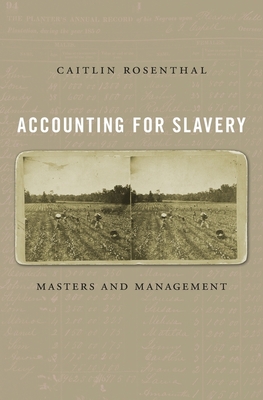

 Harvard University Press
Harvard University Press
Accounting for Slavery: Masters and Management


Key Metrics
- Caitlin Rosenthal
- Harvard University Press
- Hardcover
- 9780674972094
- 9.4 X 6.1 X 1.2 inches
- 1.4 pounds
- History > United States - 19th Century
- English
 Secure Transaction
Secure TransactionBook Description
Slavery in the United States was a business. A morally reprehensible―and very profitable business...Rosenthal argues that slaveholders in the American South and Caribbean were using advanced management and accounting techniques long before their northern counterparts. Techniques that are still used by businesses today.
―Marketplace
A Politico Great Weekend Read
Accounting for Slavery is a unique contribution to the decades-long effort to understand New World slavery's complex relationship with capitalism. Through careful analysis of plantation records, Caitlin Rosenthal explores the development of quantitative management practices on West Indian and Southern plantations. She shows how planter-capitalists built sophisticated organizational structures and even practiced an early form of scientific management. They subjected enslaved people to experiments, such as allocating and reallocating labor from crop to crop, planning meals and lodging, and carefully recording daily productivity. The incentive strategies they crafted offered rewards but also threatened brutal punishment.
The traditional story of modern management focuses on the factories of England and New England, but Rosenthal demonstrates that investors in West Indian and Southern plantations used complex accounting practices, sometimes before their Northern counterparts. For example, some planters depreciated their human capital decades before the practice was a widely used accounting technique. Contrary to narratives that depict slavery as a barrier to innovation, Accounting for Slavery explains how elite planters turned their power over enslaved people into a productivity advantage. The brutality of slavery was readily compatible with the development of new quantitative techniques for workforce organization.
By showing the many ways that business innovation can be a byproduct of bondage, Rosenthal further erodes the false boundary between capitalism and slavery and illuminates deep parallels between the outlooks of eighteenth- and nineteenth-century slaveholders and the ethical dilemmas facing twenty-first-century businesses.
Author Bio
I am a historian of 18th and 19th century U.S. history. My research focuses on the development of management practices, especially those based on data analysis. Methodologically, I seek to blend qualitative and quantitative methods and to combine insights from business history, economic history, and labor history.
My first book, Accounting for Slavery: Masters and Management(link is external) (Harvard University Press, 2018) won the Simpkins Award of the Southern Historical Association as well as the first book prize of the Economic History Society. It was also featured as a "Five Books" best book in economics for 2018(link is external) and honored by the San Francisco Public Library Laureates. The book explores the development of business practices on slave plantations and uses this history to understand the relationship between violence and innovation, themes that led to the book's inclusion in the New York Time's 1619 Project(link is external).
Before coming to Berkeley, I was the Newcomen Postdoctoral Fellow at Harvard Business School(link is external), and before that I worked as a consultant with McKinsey & Company. My work is motivated by the hope that more complete histories of management can help us to explore deep political and ethical questions, many of which continue to face modern businesspeople.
My undergraduate teaching focuses on the history of capitalism and of data practices. In 2016, my course on "The History of American Capitalism," which blends methods from economic, business, and labor history, was awarded the American Cultures Innovation in Teaching Prize.(link is external) I also offer a course on called "Calculating Americans" on the history of data practices, considering everything from the U.S. Census to social surveys, insurance policies, medical records, and sports.
I advise graduate students on a variety of topics related to data and economy, and I support students seeking career opportunities within and beyond academia. In 2019, I received the Carol D. Soc graduate mentoring award.(link is external)
Education
- PhD, Harvard University, History of American Civilization
- AM, Harvard University, History
- BA, Rice University, Political Science, summa cum laude
Source: University of California Berkley
Videos








Community reviews
Write a ReviewNo Community reviews